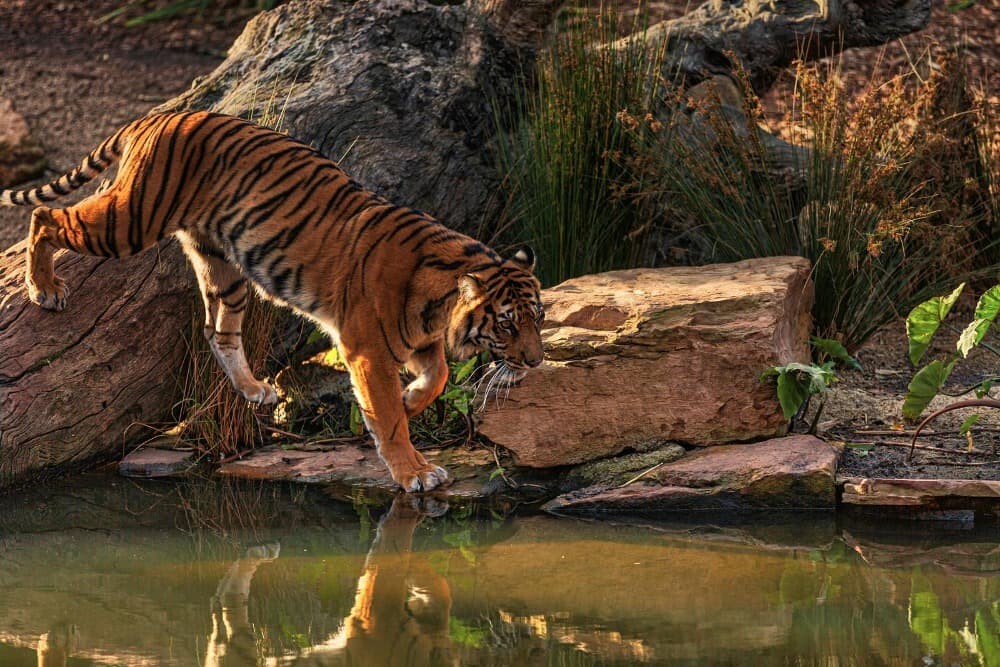India, another wonderful destination that has much to offer if you choose it for your volunteering experience.
A country with a rich cultural heritage, marvelous people, impressive monuments, and landscapes that will leave you in awe.
India is home to various national parks such as Ranthambore, Sundarbans, Jim Corbett, or Bandhavgarh, which are a must-visit if you want to enjoy nature and wildlife. That’s why today we’ll tell you about some characteristics and curiosities of the most popular animal.
The Bengal tiger
Although India is home to the largest population of Bengal tigers, you can also find them in other countries such as Bangladesh, Nepal, Bhutan, and Myanmar.
The Bengal tiger adapts quite easily, and that’s why it can be found in different habitats that provide them with the necessary resources for survival. However, it is true that all of them currently face threats due to the loss of these habitats, poaching, and human-tiger conflicts.
We can find them in:
- Tropical and subtropical forests: Both evergreen and deciduous.
- Mangroves: Especially in the Sundarbans, where they have adapted to living and hunting in an aquatic environment.
- Grasslands and savannas: Where they can find abundant prey.
- Mountain forests: At varied altitudes, depending on the availability of prey and human pressure.
The Bengal tiger is the most numerous tiger subspecies, with an estimated population of around 2,500 to 3,000 individuals in the wild.
They have orange fur with vertical black stripes that vary in thickness and length. Their belly and inner parts of the legs are white. Males are usually larger than females, weighing between 180 and 250 kg, and measuring 2.7 to 3.1 meters in length, including the tail. Females weigh between 100 and 160 kg.
They are carnivores and mainly feed on deer, wild boars, and buffaloes.
This majestic animal is also an important cultural symbol and a key species in the ecosystem, playing a crucial role in regulating prey populations and maintaining the health of forest habitats.

CURIOUS FACTS ABOUT THE BENGAL TIGER
EXPERT SWIMMERS
They are excellent swimmers and enjoy water, unlike many other felines. They can swim long distances and often dive into rivers and lakes to cool off.
THEIR ROARS
The roar of a Bengal tiger can be heard up to 3 kilometers away. This roar allows them to communicate with other tigers in their territory. They use a variety of vocalizations to communicate, including growls, grunts, meows, and purrs. Each sound has a specific purpose, such as mating calls or warning other tigers.
SOLITARY HUNTING AND TERRITORIALITY
Unlike lions that hunt in packs, Bengal tigers are solitary hunters. Each tiger has its own territory, which it fiercely defends. Male territories may overlap with those of several females, but males generally do not tolerate the presence of other males. They are masters of ambush. They use their natural camouflage to silently approach their prey before making a deadly leap. They can reach speeds of up to 60 km/h over short distances during the hunt. They use a combination of urine, feces, and tree markings to mark their territories. These chemical signals communicate their presence and dominance to other tigers.
They have night vision six times better than that of humans, making them very effective hunters at night.

FUR
Although Bengal tigers are generally orange with black stripes, there are rare variations such as white tigers (due to a genetic mutation), which are equally impressive and are a great attraction (unfortunately) in wildlife parks and zoos. Each tiger’s stripes are unique, similar to fingerprints in humans. No two tigers have the same stripe pattern.
MATERNITY
Female tigers are extremely dedicated mothers. They raise their cubs alone and teach them to hunt. Cubs stay with their mother until they are two or three years old before dispersing to establish their own territories.
In the wild, Bengal tigers can live from 10 to 15 years, although in captivity they can live up to 20 years due to the absence of threats and a controlled diet.
If you want to learn more about this incredible animal, we recommend that you travel to India and visit some of its National Parks.
It’s a spectacle of nature.




